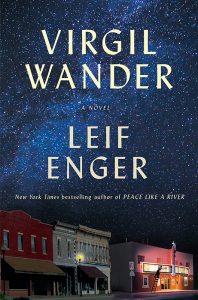Virgil Wander
By Leif Enger
Atlantic Monthly Press, 2018

Virgil Wander, which by the way is the name of this novel’s narrator, is set in Greenstone, a dying town in Northern Minnesota on the shores of Lake Superior. Virgil Wander runs a movie theater there that doesn’t turn a profit. He’s also the Town Clerk. He’s also stuck, meaning his life doesn’t have purpose or direction, he feels incomplete, he’s caught in his past. This novel is the story of his re-birth, of the re-birth of the town, and of new beginnings for many of its characters.
The novel opens just after Virgil has driven off the road on a snowy night and into the lake, rescued at the last minute by a friend who saw it happen. This near-death experience marks the beginning of Virgil’s re-birth. Sometimes it takes a blow to the head to re-set your vision. After it, he seems different. He sees differently. He behaves differently. And it’s for the best. Then a stranger comes to town, a Norwegian man whose son lived in Greenstone. The man never met his son, who disappeared a decade ago, leaving a wife and young child. The man, named Rune, comes to Greenstone hoping to learn about his son, Alex. Rune makes kites—not the kind you flew as a kid but beautiful, extravagant kites—and Virgil takes him in as a houseguest. Rune has a magical quality of drawing people and animals to him, of putting people at ease, of warming them. He is the perfect companion for a narrator embarking of a change of perspective.
Reviewers of Enger’s other two novels, Peace Like a River and So Brave, Young, and Handsome, have described his prose as “twinkle-eyed,” and commented on how easily he draws the reader into his narrative. He’s also been called a “musical, sometimes magical” storyteller. His prose is certainly warm-hearted, down-to-earth, engaging. Think of the News from Lake Woebegone without the edge. There is an element of magical realism in Enger’s plotting. Reading Virgil Wander you always have the sense of larger powers at work for good behind the events of the story. There are mythical elements to the narrative as well: an ominous man that Virgil sees standing on the water and beckoning him into the lake; a giant sturgeon that is a teen-age boy’s white whale; Rune’s extravagant kites that change people when they fly them.
At one point in the novel, Virgil is talking to an entertainment lawyer in Los Angeles about the Midwest. The exchange goes, in part, like this:
“Your caution sounds Midwestern,” I told him.
“I aspire to the Midwest.”
“Don’t be fooled by our modest dress, we’re surprisingly devious.”
“Even I have seen Fargo, and it isn’t your modesty I admire. It’s your
solitude.”
This is undoubtedly a Midwestern novel, from laconic exchanges like this one to the narrator’s self-deprecating tone, to the off-kilter characters, to the overlay of mythic elements that invest the ordinary with deeper meaning.
If you seek an ironic but ultimately warm-hearted, hopeful, and forgiving story told through beautifully crafted prose, Virgil Wander is for you.
You must be logged in to post a comment.